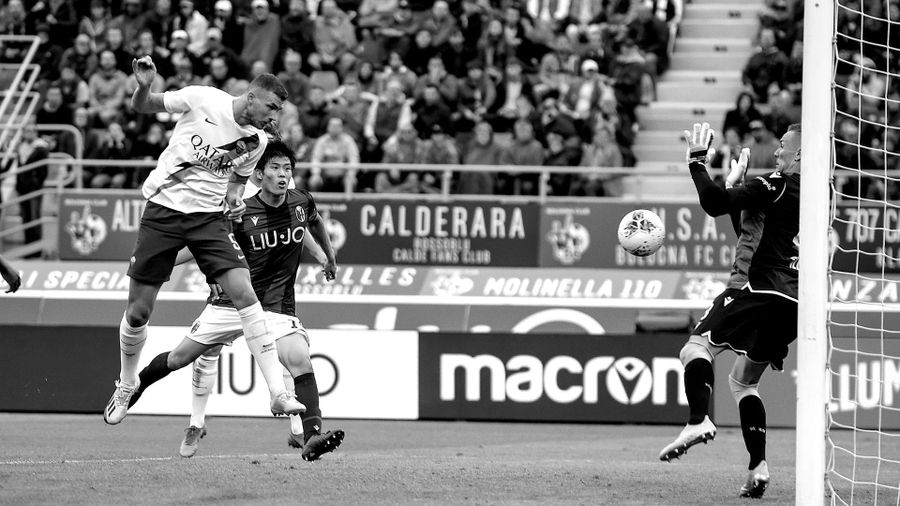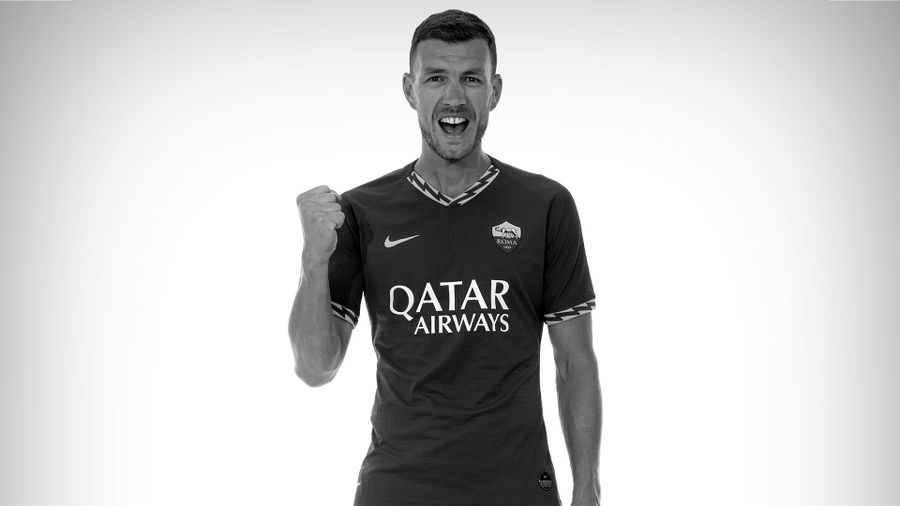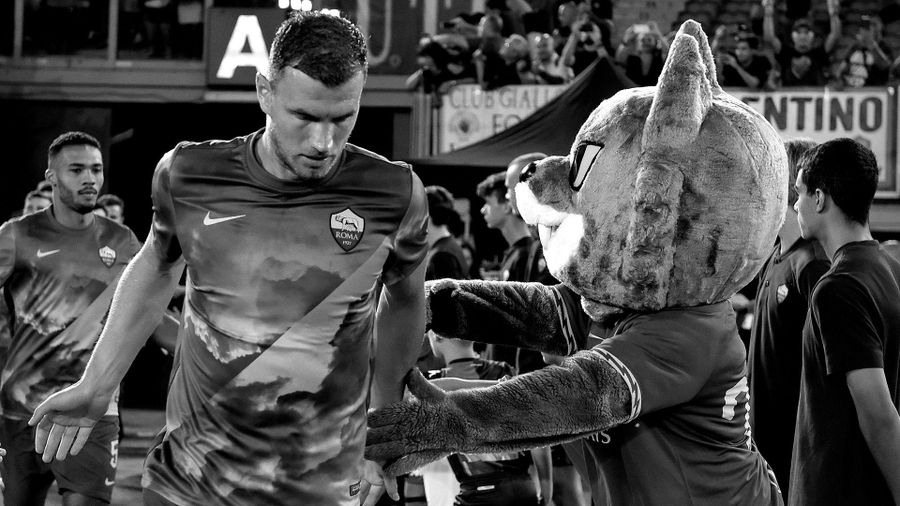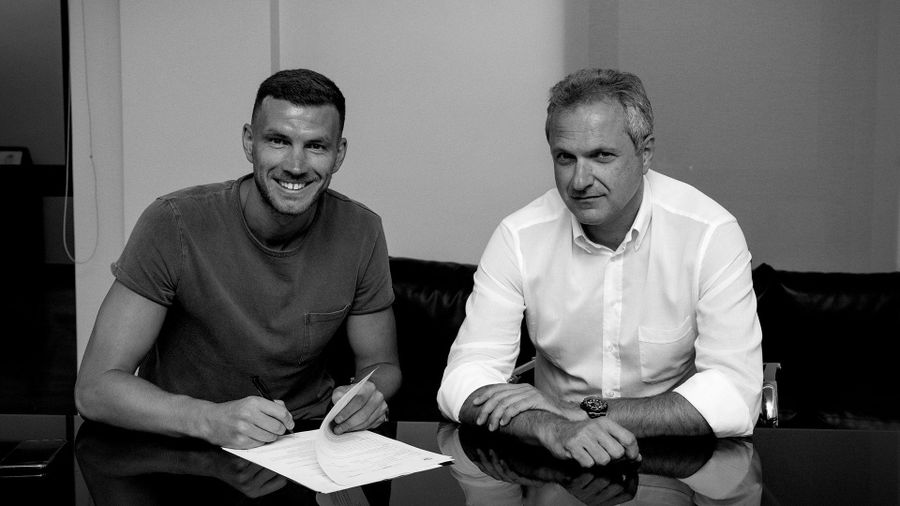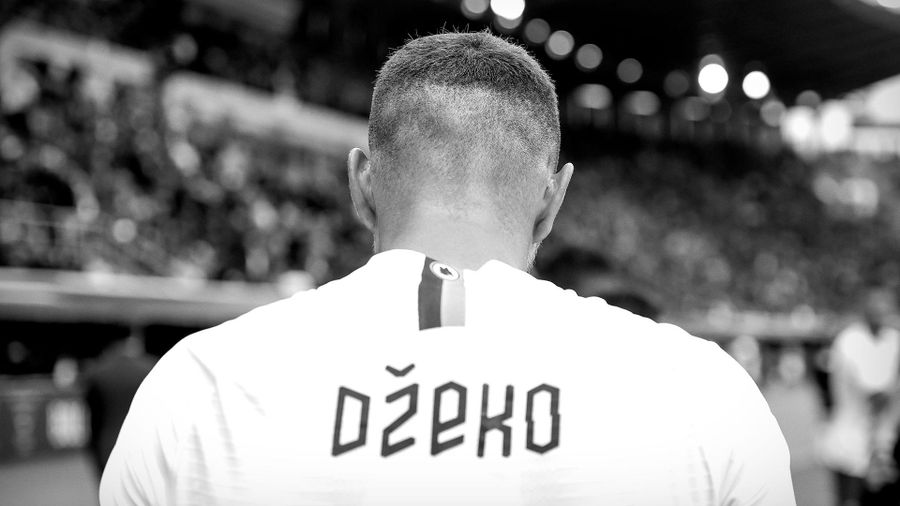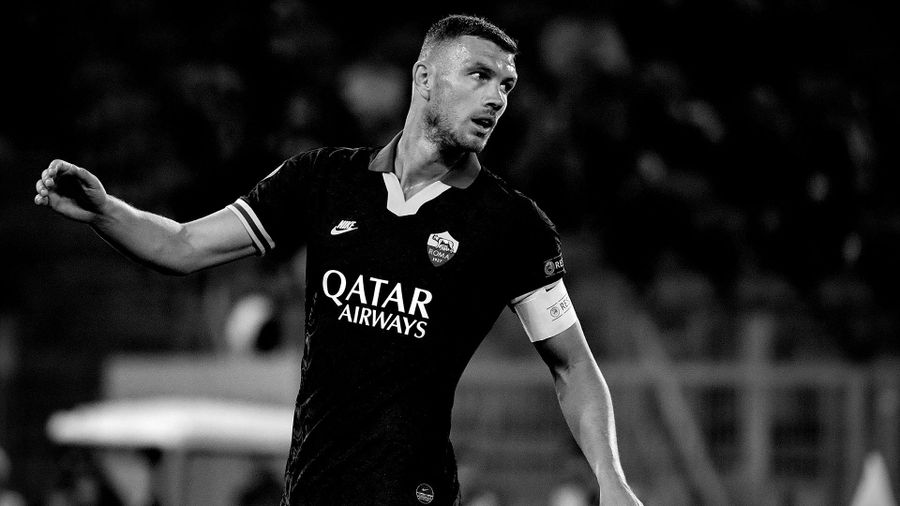
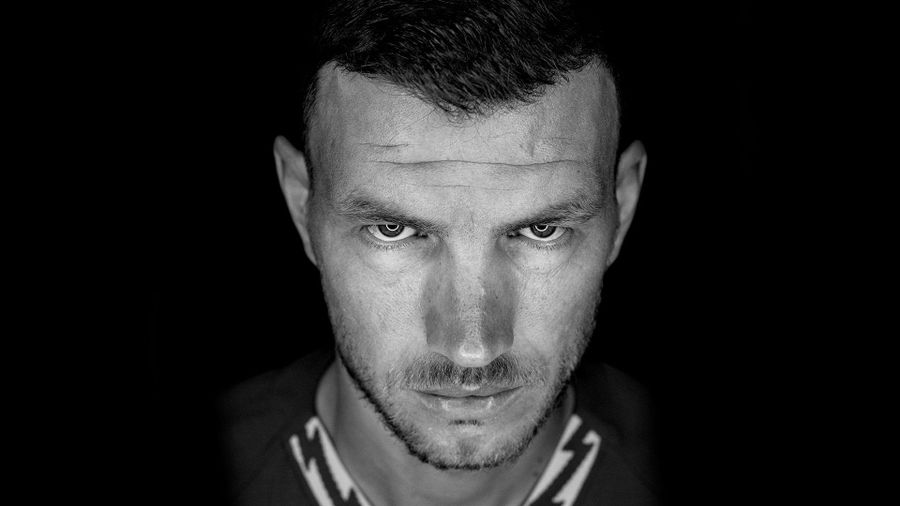
After signing a contract extension with the Giallorossi this summer, Edin Dzeko – as he proudly said himself at the time – effectively confirmed that Rome, for him, is home.
The first player to score 50 goals in three of Europe’s big five leagues (to go with 50 goals at international level, too), Dzeko has scored goals everywhere he has been – leaving his mark at clubs across the continent.
Yet now, as he enters his fourth season in the Italian capital, his new deal all-but ensures he will end his career having played more games, and scored more goals, for Roma than any other club.
What he still wants to do, of course, is ensure he claims some trophies with the club too. As he focuses on helping lead the Giallorossi into a bright new future, we sat down with the striker to discuss everything that brought him to this point…
So, let’s start at the beginning, the very beginning. Where do you think your passion for football came from? Was it something natural, or was it something that your dad pushed you towards?
“I don't know. My father was a football player as well, in the lower leagues in Bosnia, so it’s definitely possible he helped. But you have to remember it was the war in Bosnia, when I was young. So I started playing quite late, only after the war stopped. Immediately after it ended my dad began to take me - I think I was nine and a half, 10 years old when he brought me to play football, to go to the first training sessions. And then after that I watched some of his games, which I couldn’t do before because of the war.
"I think it's probably in the genes but it’s also just something we all want to do, you know? Kids, they always love to chase the ball around and for me everything followed from there.”
The war, was it something you were very aware of, or was it something that was shielded from you, by your parents?
“No, I was … I was very aware. I definitely know what it was. But it's in the past. I don't want to talk about it now. But obviously I was young: six years old, something like that. But even if I was well aware, probably for my parents and for the other older people it was much, much more difficult. For the kids, you know, you always want to play - and sometimes you're not so aware of all the danger.”
When you did eventually start playing, did you always think you would end up as a striker?
“I don’t really remember, you know. But, of course, at the beginning, when you are 10 and you are all starting out, they put you anywhere. Over time they start to find your position, which one they think is the one for you. But you know, I was always scoring goals. So I was always given that role - sometimes I would play on the right wing a little bit, but I was mostly always trying to score goals.”
Because your dad played a bit at a high level, did you always think that you would get to some level in the game? Did you expect to succeed?
“To be fair, I wasn't thinking about that, you know. Of course, everyone is dreaming about doing that, about being someone and achieving something. But of course, as you know, when you're young you don't think too far into things. I think probably there was an element too of… in the end it wasn’t the case, but at the time I think in my mind I didn’t think it was even possible to make it into a career – so I never really thought much about it.”
But it did become possible. And soon you start to play professionally in Bosnia. When did you start to think that maybe you were good enough to not just have a career in your country, but you could go further into Europe? Or was that something that never happened until it became a reality?
“I don't know, to be fair. You have ups and downs, you know, especially when I was younger - in my country it was always about older players. They would always be telling you, ‘You're still young…’. So it wasn’t always easy to get regular chances.
"Looking back now, I don't know - maybe at that time I wasn’t good enough, or maybe I was and they just favoured the older players. But, in the end, for me it was important to move to Czech Republic with the same coach who was also the coach at my club in Bosnia [Jiri Plisek]. When he went back to Czech Republic after a few months, he called me and I went straight to him because I was sure I could learn and I could improve with him, and by going away and experiencing a new country. It definitely gave me more opportunity to improve and work, working more extensively with him again.”
Was that your first move away from home? How difficult was it for you? Because now you have lived in plenty of countries, and speak plenty of languages… but was the first move a culture shock?
“Yeah, I mean, I was I was 19 years old, maybe 18 and a half. I don't remember exactly. I think it was the summer of 2005. And, yeah, obviously, it was the first time I had left home for an extended period. It wasn’t easy for me, it wasn’t easy for my parents – but that’s life. I became a man by leaving though, because I had to deal with so many things I hadn’t even thought about before.”
Eventually you then went on to Germany, to Wolfsburg. Your career has seemingly been one of gradual progressions, but was there ever a point when the jump felt too big? Going from Teplice to Wolfsburg, that feels like maybe it was the biggest jump in level of the lot. Did it feel like that at the time?
“Probably. Yes. It probably was because the Bundesliga is one of the top five leagues in Europe. When I went there, I was lucky to have a coach, Felix Magath, who always pushed us to our maximum, our very limit - and even more than that sometimes, you know? Because we really trained very hard. I think this was another important lesson for me.
"And so, like I like to say, it was step-by-step. Always step-by-step. I was in Bosnia, then I took a step and I was in the Czech Republic, then I took another and I was in Germany. I wasn’t sure I could make that first step and then, not long after, I made another. But it wasn't straightaway to the Premier League, for example. So I definitely needed that experience to continue to improve – and at Wolfsburg I had the right coach, the right team, it was the right club. So yeah, everything was moving in the right direction.”
I wanted to ask about that Wolfsburg team, that won the title in 2009. Because it’s remembered fondly as a very attacking, very strong side – yet in hindsight it can be a bit harder to understand how it happened. Magath isn’t really renowned for an attacking style, and yourself apart many of the protagonists of that title win – Grafite, Misimovic – seemed to peak at that time, rather than go on to achieve a lot more before or after. I guess the question is, what made that team so effective?
“I mean, we were, first of all, we were more than fit. You know, physically, we were ready for everything. And we also had a lot of young players, mostly young players even, with only two or three experienced players. The basis though was young players who had quality and could run a lot. We always played the same system, with two strikers in a 4-3-1-2. And for our team it was perfect, and a perfect run. And at the end, we won the league. But I think it should be clear that we didn’t win it per caso.”
It didn’t happen by chance?
“Yeah, we definitely deserved that. Because we were winning against everyone. We were scoring five goals sometimes against some good teams. It was completely deserved.”
But it seemed like everything just came together perfectly at that time.
“Certainly. And then after that you do need a little bit of luck too. But we definitely had top quality players, a top coach, and there wasn't so much pressure, you know? Our target at the beginning was not to win it. Our target was maybe to finish in the top four, let’s say, to qualify for the Champions League - but then when you get to the end and you are in the hunt you want to go and win it. And that’s what I did.”
Then you went to Manchester City, a period you are often asked about. But you won the title there too – how do you compare those two titles? The pressure was definitely on with City at that time…
“Also because City at that time hadn’t really won anything, you know, for a long time. At Wolfsburg nobody expected us to win the league and we did it. At City, everybody was expecting us to win it at some point. We had spent some money, bought some big players, there were a lot of good players. So obviously, there was pressure to win it. And with so many quality players, at the end, we did it.
"We did it two times while I was there. And yeah, both times the win was well deserved. Even though we had that pressure and expectation we played attacking and attractive football - sometimes, you know, even with three strikers. It’s not easy to do that and win consistently.”
How do you think City fans perceive you now? Do you think they have more appreciation for what you did there than perhaps some did at the time?
“Maybe. I don't know, maybe they appreciate me even more now than when I was there. When you are there, people can get used to you. Things can change, if you have a good game, if you have a bad game. Mostly it depends on the results of the team. And then when you leave… it can be the same as with a girl; only when they leave do you realise what you actually had in the first place! But I think they appreciate me even more now than they did when I was there – even if I must say that the City fans were always there for me, and I was doing well during those four-and-a-half years.
"At some point though it became time to change. But I still hear the City fans occasionally singing my name, you know, and some write to me calling me a legend. It’s nice.”
During that period City went through a lot of strikers, and not many were as effective as you were, especially when almost everyone had to work around Sergio Aguero.
“There was always four top quality strikers there. So we didn’t play all the time. That's why I wasn't always happy, you know, but with so much quality in the team that’s the battle you always have to face. We had Sergio, Tevez, at different times there was Jovetic, Balotelli, Negredo, Adebayor, Bony… so many strikers were at the club in that period. But I always had a good understanding with Sergio when he played, I thought we complemented each other quite well. We played well together, the tall and small partnership suited us well.”
Going back to what you said about City, do you think football is like that in general? That only with time do people really appreciate what players have done for a club?
“I think you realise that sometimes it’s a case that people won't fully appreciate you until you're gone. Until they see what they had, or what you did. It’s about what you are doing now or what you are going to do for them. But I mean, that's football. You know, that's how it is.”
Moving on to Roma, how has it been since you came back from preseason this summer. How was that? What were your first impressions of Paulo Fonseca?
“They were good. From the first day we were working hard, you know, but mostly with the ball - which is always good for us players. The players like that, we want to have the ball all the time, he wants to work with the ball a lot of the time, so that was perfect for me. I was having fun from the first minute, I have to say.”
What were your initial conversations like with the coach? This summer a lot of players, especially new signings, have spoken about how important conversations with him were.
“You can see straight away, from the setup of the training session, that he knows what he wants to do. He has been transmitting his ideas to us in a positive way, and he’s always open to discussions and conversations and everything else. Which is what we need. I think the key thing is that he is not just a good coach – but he’s a good guy as well. He’s honest and he’s open, which is difficult to find sometimes.”
It’s important for players to have a coach they trust. That helps everything.
“Of course. I mean, it's important that you can have fun doing what you are doing.”
Did that factor into your decision, then, to sign a contract extension later in the summer?
“Yes – I mean, it was a bit of everything to be honest. The club, the coach, the teammates, everyone else too – all of that influenced my decision. Everyone showed me how much they appreciated me and how much they wanted me to stay. At the end of the day, I was always happy here too, you know? And with my family being happy here, my kids having been born here, in the end I was happy to be staying.”
I guess the decision-making process can change a bit once kids come into the picture, once you have a family?
“Of course, you don’t think just about yourself any more. When I was younger, I was always thinking only about where I wanted to go – it was my career and it was my decision and I wanted to progress. I am not going to play football for my whole life, you know, so you start out making decisions with that lack of time in mind and then, with a family, you think more about what helps them most too. Now my decision comes last, almost. It’s a more complete assessment of things. That’s completely normal, it’s true of most people. And my family are very happy here. It’s been fun here.”
But, speaking purely as a player, do you feel that the extension now means that this is where you will define your legacy as a player? That when people in the future think of Edin Dzeko, the first club that comes to mind will be Roma.
“I’ve signed for another three years. So if I stay for another three years, I will have spent seven years at this club. So by that point it will be the longest period I’ve spent at any club. It’ll be the club I’ve scored the most goals for, it’ll probably be the team I’ve played the most games for. And, of course, hopefully with some trophies in there too. That is always the target.
"I think this year, especially, we have brought in some good, experienced players who are ready to help us straight away. That is another factor. When you have the players ready, ready to play and to fight from the very first game, then you can chase your targets – which for us includes the Europa League, the Coppa Italia… and qualifying for the Champions League, which we were all disappointed not to do last season.”
Do you focus much on your individual accolades? Are they important to you? For example, you are close to becoming the seventh player to score 100 goals for Roma – by the end of the season you could even be third on the club’s all-time scorer’s list. You are on the verge of putting yourself in a prominent position in the club’s history…
“I think it’s fair to say it was something that I was thinking about a little bit [when considering my future]. I mean, at the end of the day not everything is about the goals – of course I’m a striker, and I live to score goals, but the most important thing is always to get the win. We have to be more consistent this year than we were last season if we want to reach our targets. And hopefully, with all the experienced players we have, I think we can do that.
"Beyond that, then we will see about the goals. But I would be lying if I said I’m not thinking about reaching 100 goals, I’m not thinking about those other milestones.”
Do those approaching milestones not make you even more proud, given how things started for you here?
“That’s what football can be like, you know, there are always ups and downs. The important thing is not to give up. If I had given up after that first year, then nothing would have happened. Those things happen: bad games happen, bad weeks happen, bad months happen too.
"It happened to me before that, too. But when that does happen, after that it is all up to you; it’s up to you how you react. I tried to show my real qualities, and I managed to do that in 2016-17 and over the seasons since then. And, hopefully, the next few years can be even better, because I feel good. Physically, I feel good. Which is really important and hopefully something that continues – I keep maturing as a player.”
Do you feel your role within the squad has now changed – on and off the pitch? You are one of the leaders now, a mentor to the younger guys.
“I'm one of the oldest now, with Aleks [Aleksandar Kolarov], Fede [Federico Fazio] and Antonio Mirante. And obviously we have to be the example for the younger players - even if today it is not so easy. But we try to help them and bring them down the right path. We want to help them all approach things in the right way because we need them: every player, in every position can be important for us this season as we try to reach our targets. We all need to work together.”
Are there things you know now, about being a professional footballer, that you wish you knew when you were younger?
“I think that is part of the process, you know. Obviously they cannot know those things, like we didn’t know when we were younger. But even when I was younger I remember players always telling me, ‘You will understand one day what experience means to a player’. And I was always like, ‘What?!? Experience? What is that? Who needs that?!’ But until you see it, until you know it, you can’t really understand.
"There's different things these days, there's social media and things like that. The important thing is you give 100% on the pitch. Every game, every training session, they all give you something and you can learn something from them. For the young players I think it's important that they see the older players are out there, always putting in 100 per cent - and have been doing it for 20 years. But it’s a process for every player.”
Is that commitment from everyone more important to you now, as you look to maximise what is left of your career?
“Yeah, I mean, of course, of course. Like I said before, I'm not going to play for another 10 years. Okay, maybe I could do it – but not easily, and possibly not at the top level. So I have a few more years, and I want to give everything you know, everything possible. The important thing is to stay fit and avoid injuries. And after that I will give my best, you know, and try to ensure this team reaches its targets. And, I think, over the next few years we have the quality to do that – we just have to be more consistent and help each other in any way we can.”
Check out earlier entries in our Big Interview series:
AS Roma x Gianluca Mancini
AS Roma x Aleksandar Kolarov
AS Roma x Nicolo Zaniolo
AS Roma x Jim Pallotta
AS Roma x Cengiz Under
AS Roma x Paulo Fonseca
AS Roma x Leonardo Spinazzola

 Tickets
Tickets
 Shop
Shop














